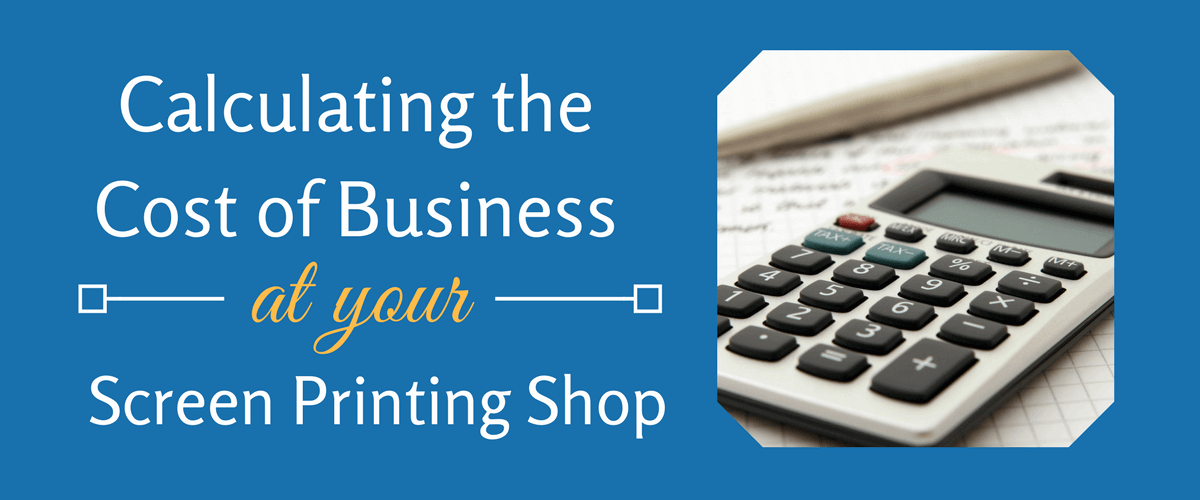

Revolutionizing the screen printing industry through cutting-edge technology and quality service
Anatol Equipment Manufacturing Co.
1429 S Shields Dr
Waukegan, IL 60085


Revolutionizing the screen printing industry through cutting-edge technology and quality service
Anatol Equipment Manufacturing Co.
1429 S Shields Dr
Waukegan, IL 60085

One of the most important parts of business is knowing what things cost. At first, some screen printing shop owners are inclined to lump things together. Revenue generated less expenses equals what’s left over – or profit. But in order to grow your business it’s important to know what your production costs are so pricing can be set accordingly.
Fixed expenses are costs that don’t change based on how many shirts you produce and sell. They’re expenses you pay regularly – on a monthly basis, for example. Some fixed monthly costs include:
Carefully budgeting these monthly costs will help you develop a breakeven forecast – how much you have to sell to meet your expenses. But fixed expenses are only half the story; you also have to account for variable expenses.
Variable expenses are all the costs that change based on the specific parameters of your print jobs, including labor time and supplies needed. To best illustrate how to calculate your variable expenses, let’s go through an example print job…
Job specs: Printing white ink on black t-shirts
72 shirts – 1 color front left chest P/F/P (Print/Flash/Print) and 1 color back P/F/P
Labor Expenses
When you first print a job, calculate the labor expense of your printer. This would be:
The time it takes to print the job* X the hourly wage of your printer
In this case, we’ll say it takes 1 hour to print the shirts (30 minutes each side), with your printer making $15 an hour.
1 hour X $15 = $15 total
To find out the cost per shirt, divide the total expense by the number of shirts.
$15 divided by 72 shirts = $0.21 per shirt
Art Expenses
Next, you have to figure out your art expenses. This would be the time it takes to create and separate the artwork for the job, multiplied by the hourly rate of the artist.
For this example, let’s say it takes 40 minutes (20 minutes each side) to prepare the artwork, and the artist makes $18 per hour.
40 minutes = .67 hours
.67 hours X $18 hour per hour = $12 total
To find out the artwork labor cost per shirt, divide the total expense by the number of shirts.
$12 divided by 72 shirts = $0.17 per shirt
Materials
Film, ink or toner:
$2.00 per color X 2 colors = $4 total
$4 divided by 72 shirts = $0.06 per shirt
Screen and Ink Costs
Figure $30 per screen, which includes the life of the screen, emulsion, exposing, washout, tape, blockout, reclaiming materials, cleaning:
$60 (2 screens) divided by 72 shirts = $0.84 per shirt
Post Production Labor Expense
This would be the time to clean, reclaim, coat screens, expose, shoot out and prepare for press. The average time is 40 minutes per screen. Let’s say the worker responsible makes $13 an hour.
1.34 hours (.67 hours per screen) X $13 = $17.33
$17.33 divided by 72 shirts = $0.24 per shirt
Total
So to find the total variable printing expense for this job…
$0.21 + $0.17 + $0.06 + $0.84 + $0.24 = $1.52 per shirt
While there may be some difference of opinion regarding how and where expenses should be book-kept, the important thing is to make sure you factor in all expenses when determining what your prices should look like. Once you have a base, make sure to audit it regularly to ensure the financial viability of your business. Regardless of the size of your shop, remember to pay yourself and factor that cost in the appropriate area. You probably noticed that we haven’t included apparel costs, shipping and handling. Mark-ups are the subject of a whole ‘nother discussion.
*Includes set up, printing and tear down.
Looking for more info on how to decide your screen printing prices? Check out these blog posts:
The Delicate Matter of Raising Your Screen Printing Prices
How to Boost Sales by Lowering Prices on Your Screen Printing Services
Your message was successfully sent!